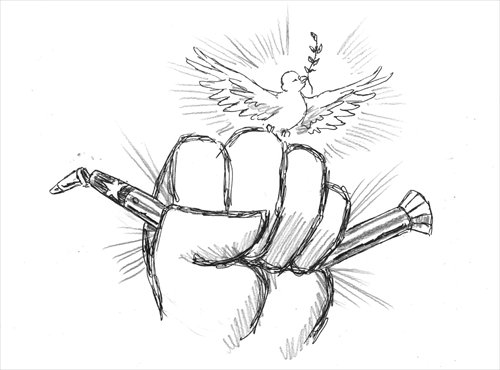China, Russia need to join hands to secure stability of Korean Peninsula

Illustration: Peter C. Espina/GT
Chinese Foreign Minister Wang Yi visited Russia last week. The two sides coordinated their stance over the North Korean nuclear issue, stating that both China and Russia firmly champion denuclearization on the Korean Peninsula and would not give up efforts to resume the Six-Party Talks.
China and Russia of late have been deeply locked into a double-layered predicament on the Korean Peninsula, threatened by both the North Korean nuclear tests and the possible deployment of the THAAD missile defense system in the South.
Sticking to a strategic line of "parallel economic construction and nuclear weapons development," Pyongyang launched a long-range missile and placed a satellite into orbit with stubborn determination to acquire prohibited nuclear capabilities.
North Korean leader Kim Jong-un ordered his country to be ready to use its nuclear warheads at any time and to turn its military posture to "pre-emptive attack" mode, which aroused deep concerns in the international community. The US and South Korea have carried out joint military drills that are unprecedented in size. The confrontational acts of both sides have escalated tensions on the peninsula.
China and Russia are concerned that if the North Korean nuclear problem cannot be properly tackled, countries like South Korea and Japan will follow suit in nuclear weapons development. Worse, a regional war may break out, causing turbulence along borders with China and Russia, floods of North Korean refugees, destruction to the environment and a humanitarian crisis.
The two countries are also confronted with a second predicament of the possible deployment of the THAAD system in South Korea. According to the Associated Press, Washington and Seoul last week began formal talks on deploying this sophisticated system.
During Wang's Russia visit, Wang and his Russian counterpart Sergey Lavrov expressed their opposition to the deployment of the THAAD system. They hold that putting the system in South Korea exceeds the actual defensive demands of the Korean Peninsula and would "inflict direct harm to the strategic security interests of China and Russia."
China and Russia should join hands and take a dual track of curbing both North Korea's nuclear ambition as well as the deployment of the THAAD system.
Chinese President Xi Jinping said in 2013 that "No one should be allowed to throw a region and even the whole world into chaos for selfish gain."
In order to address the North Korean nuclear conundrum, China has put forward a proposal to pursue the denuclearization of the peninsula and the replacement of the armistice agreement with a peace treaty. Only if the two are negotiated in parallel, can a scientific, rational and balanced solution be reached to resolve Pyongyang's nuclear problem.
The situation on the peninsula has not improved since UN Resolution 2270 took effect. Instead, it has deteriorated. Concerning North Korea's advancement of its nuclear missile plan, China and Russia cannot sit by and see a disruption to the peace and stability on the peninsula and the Northeast Asian region.
The two also need to thwart the deployment of the THAAD system. Deploying the THAAD system in South Korea poses direct threats to the strategic and security interests of China and Russia. They must work together to prevent the US and South Korea from causing turbulence on the peninsula without hesitation so as to safeguard the security interests of both countries.
Northeast Asia is a complicated region full of hotspots and conundrums. China and Russia, for the interest of the whole region, should enhance cooperation, communication, coordination, information-sharing and military trust to lower the risks of war on the peninsula.
At a critical moment when the peninsula situation is spiraling out of control, Beijing and Moscow must demonstrate to Pyongyang, Washington and Seoul their resolution to safeguard the national interests and stability of the region by getting rid of the double-layered predicament through the method of dual track.
The author is a professor at the College of Political Science and Public Management, Yanbian University.opinion@globaltimes.com.cn